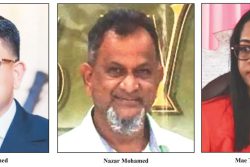(Trinidad Express) The Privy Council has shot down an application by event management company Wild Goose Ltd, in its attempt to challenge a ruling delivered against it by the Court of Appeal last October.
The ruling in the Appeal Court had to do with a decision of police and officials at the Environmental Management Authority (EMA) to prematurely stop a Carnival event at the Queen’s Park Savannah in February 2019, because of excessive noise.
Following the ruling, attorneys representing Wild Goose Ltd, sought to have the ruling of the Court of Appeal overturned by the Privy Council in London, England.
However, on May 8, the court refused its application to further appeal on the ground that the application did not raise any arguable point of law or public importance.
Essentially, the Privy Council agreed with the ruling of the three judge Appeal Court panel comprising Allan Mendonca, Prakash Moosai and Gillian Lucky.
In addition to dismissing the application for appeal, the Privy Council also directed that attorneys for Wild Goose Ltd file submissions on the issue of cost. Should the parties fail to agree on the quantum of cost that Wild Goose Ltd should pay to the EMA, it will be determined by the court.
A win for the people of T& T
In a media release issued yesterday, the Ministry of Planning and Development said the pronouncement of the Privy Council was ‘a win for the people of Trinidad and Tobago who have been lobbying for clarification on the specific duties and powers of the responsible authorities.’
The three-judge panel had stated that the time has come for legislative intervention as the issue of noise pollution is ‘ripe’ and therefore, the legislature should contemplate a clearly expressed path to compliance and immediate enforcement in circumstances where it is justified, the court said.
The court also said the EMA itself should utilise its express powers and give ‘serious consideration’ to designate defined areas, such as the Emperor Valley Zoo as environmentally sensitive areas.
Justice Margaret Mohammed had previously found that the EMA did not have the powers to stop the Tailgate Carnival event at the Queen’s Park Savannah in February 2019 because of excessive decibels of music.
When it had obtained its permit to host the event, Wild Goose Ltd was allowed to play music at 85 decibels between 6 p.m., and 8 p.m. and at 75 decibels from 8 p.m., to 2 a.m.
But in the ruling delivered by the Appeal Court panel, they said they had to ‘with the greatest of respect’ find that Justice Mohammed had misdirected herself in addressing the task before her as a matter of law.
Simply because no complaint was received, did not mean that the level of music was not a public nuisance, the court found, adding that public nuisance is both a tort as well as a crime.
This means, therefore, that police officers, which would include EMA officers, had the power to prosecute for the criminal offence of public nuisance.
‘The trial judge recognised this duality at paragraph 46 of her judgement when describing the remedies available in law. While it is axiomatic that no civil claim can be maintained for the tort of public nuisance in the absence of a claimant sufficiently capable of representing at least a class of the wider public, the approach may be somewhat more nuanced in the context of the duties of an officer when faced with the crime of public nuisance,’ the judges held.
‘Had she appreciated the broader scope of this evidence in combination with other permissible inferences drawn from accepted and undisputed facts, she would inevitably have found that there was sufficient basis to conclude that a public nuisance had been caused by Wild Goose,’ the judgement added.
Given its findings, the court set aside the ruling handed down by Justice Mohammed.
In the judgement that was written by Justice Moosai, the court sought to make it clear that the determination of the case was not precedent setting and was based on specific facts.
‘The decision ought not to be viewed as establishing precedent or grounding any proposition of law and that the breach of a noise variation by itself equates to a public nuisance for which officers will be empowered to act in like manner,’ the court held.
Appearing on behalf of the EMA was attorney Kelvin Ramkissoon, while Christophe Rodriguez appeared for Wild Goose Ltd.






